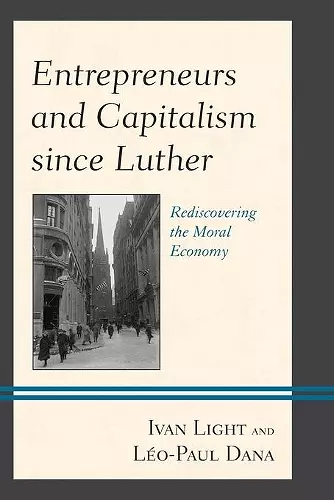Entrepreneurs and Capitalism since Luther
Rediscovering the Moral Economy
Léo-Paul Dana author Ivan Light author
Format:Paperback
Publisher:Bloomsbury Publishing PLC
Published:21st Dec '21
Currently unavailable, and unfortunately no date known when it will be back
This paperback is available in another edition too:
- Hardback£85.00(9781793621290)

In Entrepreneurs and Capitalism since Luther: Rediscovering the Moral Economy, Ivan Light and Léo-Paul Dana study the history of business, capitalism, and entrepreneurship to examine the values of social and cultural capital. Six chapters evaluate case studies that illustrate contrasting relationships between social networks, vocational culture, and entrepreneurship. Light and Dana argue that, in capitalism’s early stages, cultural capital is scarcer than social capital and therefore more crucial for business owners. Conversely, when capitalism is well established, social capital is scarcer than cultural capital and becomes more crucial. Light and Dana then trace moral legitimations of capitalism from the Reformation to the Enlightenment, the Gilded Age, and finally to Joseph Schumpeter whose concept of “creative destruction” freed elite entrepreneurs from moral restraints that encumber small business owners. After examining the availability of social and cultural capital in the contemporary United States, Light and Dana show that business owners’ social capital enforces conventional morality in markets, facilitating commerce and legitimating small businesses the old-fashioned way. As their networks become more isolated, elite entrepreneurs must claim and ultimately deliver successful results to earn public toleration of immoral or predatory conduct.
This book begins by defining market capitalism, noting that it is not as old as humanity and that capitalism as it is known today coincided with the Protestant Reformation and Martin Luther. Throughout the book Light (emer., Univ. of California, Los Angeles.) and Dana (Dalhousie Univ.) examine many contexts where morality and capitalism intersect and insinuate a symbiotic relationship whereby society tolerates immorality in business for the sake of economic advantage. The 10 chapters in part 2, which documents non-monetary resources, start with Max Weber’s cultural approach to capitalism before examining the Protestant Reformation, the Jewish Merchants of Venice, an Alaskan island, Pakistan, Korean immigrants, and Donald Trump. Part 2 then offers an explanation of how non-monetary resources can legitimate capitalism. Overall, the book provides interesting insight into the intersections of culture and capitalism within a well-researched historical context. Each chapter has its own endnotes, and there is a complete bibliography at the end of the book. The index contains key terms; however, a more comprehensive index would increase usability, though its narrowness in no way takes away from the substance of this intriguing work. Summing Up: Recommended. Lower-division undergraduates through faculty; professionals. * Choice Reviews *
Entrepreneurs and Capitalism includes excellent anecdotes on the history of capitalism. It is a short read but has useful information on the life cycle of an entrepreneur and tools that enable success. * Nathan's Papers: Books for CONGRESS *
The world is clamoring for alternative models and understanding to unbridled capitalism. In this pathbreaking and deeply thoughtful book, Ivan Light and Leo Dana provide a broad, comprehensive, and compelling analysis reconciling entrepreneurship and capitalism with ethics and morality. This important book provides a blueprint for capitalism with a human face and heart. In an era burdened by crisis and cycles of devastating cynicism, this book offers a well considered optimistic future for capitalism, entrepreneurship, and humanity. -- David B. Audretsch, Distinguished Professor and the Ameritech Chair of Economic Development at Indiana University
In this exquisitely researched and eloquently argued volume, globally renowned scholars of entrepreneurship Ivan Light and Leo Paul Dana challenge the assertion that capitalism can only generate wealth through the anti-social, unrestricted, and amoral pursuit of profit. Mobilizing a diverse array of case studies, Entrepreneurs and Capitalism since Luther: Rediscovering the Moral Economy, convincingly argues that capitalism emerged from contexts that were collectively oriented, small in scale, and socially beneficial; not unlike those maintained by contemporary religious, ethnic, and moral communities. In generating this perspective, the authors present an alternative to the dystopia of neo-liberalism that is both compelling and hopeful. -- Steven J. Gold, Michigan State University
At today’s zenith of the resource-based view of the firm, Light and Dana provide an intellectual and historical gravitas for the approach, building a view that includes not only social, reputational and skill based resources but also the all-important work ethic, which defined the distinct contribution Reformation era thinking and action made possible for today’s models of market capitalism. Tying theory to examples where the mix of cultural and community factors differ, they span the globe and ages showing where capitalism can build or have trouble taking hold. The book’s unexpected insights and rich depictions of diverse cultures make for a fascinating and thought-provoking read. -- Jerome Katz, Brockhaus Chair of Entrepreneurship, Chaifetz School of Business, Saint Louis University
ISBN: 9781793621313
Dimensions: 231mm x 153mm x 12mm
Weight: 299g
180 pages